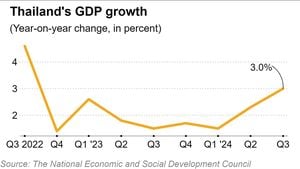Vietnam's agricultural sector has seen remarkable success stories recently, particularly through the inspiring endeavors of local entrepreneurs aiming to transform their communities. Two notable examples come from Dak Mar and Dak Na, where innovative women have made substantial strides in sustainable agriculture and tourism.
First, in the Dak Na commune, Ms. Gia Nhi has revamped the local tourism scene by designing experiential tours. With stunning landscapes, dense ancient forests, and the breathtaking Siu Phong Waterfall, Dak Na has become increasingly popular among tourists. Drawing from her travels and experiences abroad, Nhi has utilized her knowledge to develop unique tours, showcasing the beauty and culture of the indigenous So Dang people.
“I realized the potential of experiential tourism after seeing the government promote the Siu Phong Waterfall,” Nhi explained, describing her motivation to create tours after having previously never considered such initiatives. Under her guidance, the region has welcomed over 1,000 visitors annually, igniting local economic activities.
“The average income per tourist is about 300,000 VND per person,” she continued, highlighting how her efforts have resulted in monthly revenues ranging from 1 to 3 million VND for residents engaged in tourism-related activities. This has significantly contributed to poverty reduction within the community.
Nhi has not only created jobs but has enhanced the local culture and environment through guided tours, camping, cooking classes, and educational activities about the traditional So Dang lifestyle. Parenthetically, her work reflects broader trends within Vietnam, where communities are increasingly combining tourism with cultural preservation.
Meanwhile, Ms. Vo Thi Nhi, another remarkable figure, has pioneered clean agricultural practices just two years after transitioning from urban life back to her rural origin. After graduating with a degree in finance and marketing, Nhi found herself yearning for her homeland and the potential it held.
“I thought for years about leaving the stable city life for my community, wanting to contribute to its development,” Nhi shared, recounting the difficult early days of familiarizing herself with local agriculture.
Starting with her family’s kitchen garden, she gradually expanded her efforts to incorporate organic farming techniques. Through determination and ingenuity, Nhi transformed her farm, which now thrives with durian, jackfruit, avocados, and other sustainable practices.
Her farm, now boasting 2 hectares, employs closed-loop systems, utilizing organic fertilizers made from coffee husks and waste to sustain livestock such as wild boars and chickens. She has also ventured beyond simple production, linking her produce with local markets and building connections with neighboring farmers.
“The rotational agriculture model not only optimizes available resources but also creates clean and safe products for consumers,” Nhi explained, outlining her holistic agricultural philosophy. Currently, her farm generates approximately 500 million VND annually, making it both viable and notable.
The support Nhi has received from local youth initiatives helped to spread awareness of her products, leading to growing recognition for quality farming practices. Her success exemplifies how young entrepreneurs like her can engage with sustainable farming models, improving both income viability and environmental stewardship.
Mr. Ha Quoc Manh, secretary of the youth union of Dak Ha district, remarked, “Ms. Vo Thi Nhi is a great example of how young people can take risks and utilize their skills to drive sustainable local development.” This kind of endorsement has encouraged many youths to embrace eco-friendly and organic farming, recognizing its potential for rural economies.
Both Ms. Nhi and Ms. Gia Nhi demonstrate the significant influence of committed individuals on local agricultural and tourism sectors. Through their stories, it is evident how grassroots initiatives can inspire wider changes, offering valuable lessons about the importance of innovation, sustainability, and community engagement.
While Dak Na attracts tourists eager to explore the unique culture of the So Dang people, Dak Mar’s commitment to clean agriculture provides fresh, organic produce to health-conscious consumers. Collectively, these stories of Vietnamese agricultural success highlight the nation's growing recognition of the value of local resources and traditional practices.
Looking forward, local governments and their communities are expected to embrace these initiatives fully, encouraged by successes like those seen with Ms. Nhi and Ms. Gia Nhi. With continued support and cooperation among various stakeholders, it’s likely many rural areas across Vietnam will witness similar transformations, ensuring economic growth and the preservation of cultural identity.



